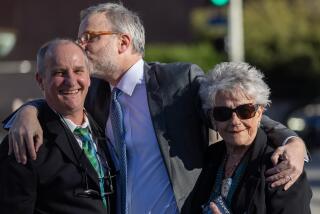Judge in Controversial Mistrial Tells His Side
- Share via
Los Angeles Superior Court Judge Stephen Lachs, who declared a mistrial in a drug case to attend a lawyers’ convention in Toronto, said Friday that he had done so because he felt “really hemmed in and didn’t know what else to do.”
Lachs also said in a telephone interview from Toronto that he still hopes the case can be tried again. But prosecutors reiterated that the defendant cannot be tried again because of a legal technicality.
Noting that lawyers for both sides in the case had assured him the trial would end by Wednesday, the judge added, “I had my plans to be at the ABA (American Bar Assn. annual meeting), and that was it.”
Lachs said he spent all day Thursday flying to the convention, arriving in Toronto that night, to preside over a 9 a.m. Friday meeting of the family courts committee.
“I still don’t know what the effect will be,” Lachs said of the mistrial. “I sure didn’t have a lot of time to do the research.”
But according to Chief Deputy Dist. Atty. Gilbert I. Garcetti, the mistrial declaration means the defendant will be set free without a jury having the chance to rule on her guilt or innocence--even though the jury had heard the entire case.
Garcetti has ordered an internal review of the matter. One result of the review could be a request by the D.A.’s office for an investigation by the state Commission on Judicial Performance, which evaluates allegations of impropriety and makes recommendations to the state Supreme Court.
The defendant in the case is Desiree Charbonnet, a 32-year-old Los Angeles woman with a 1986 felony drug conviction. She was charged with the felony possession of about a gram of rock cocaine.
A criminal defendant cannot be tried twice for the same offense. And such constitutional protection against “double jeopardy” takes effect as soon as a jury is sworn to hear evidence in a case.
The only exceptions to such protection are when one of the lawyers, the judge or the defendant becomes ill, or when there is a hung jury. In such cases, a new trial usually takes place.
Lachs confirmed that at the outset of People vs. Charbonnet, and “continually” throughout the trial, he reminded both the prosecutor, Deputy Dist. Atty. Gail A. Ehrlich, and defense attorney Michael C. Carney of his time constraint.
A 12-member jury was sworn in by noon Tuesday, and the case was ready for final arguments by about 4 p.m. Wednesday. It was then that Lachs asked whether both sides would be willing to deliver their closing arguments to the jury in his absence--an unusual, although not unprecedented, twist.
Ehrlich refused. She then asked if the case could be postponed until Lachs returned on Aug. 11. But only 10 of the jurors, plus one alternate, said they could be able to come back then.
Ehrlich was willing to have an 11-member jury decide the fate of Charbonnet, but Carney refused to go along. Lachs then declared a mistrial.
“I couldn’t think of any other option--other than to cancel my flight, which I could have done. I admit that,” Lachs said Friday.
He said he has “a feeling of great disappointment” over the furor caused by the mistrial declaration, but added that he felt the lawyers had “forced things to happen when they didn’t have to.”
Lachs, who normally handles civil cases in Superior Court, noted that he had postponed a civil case that was set for trial on Monday to preside over the drug case, which would have been dismissed had it not come to trial that day.
Under the penal code, a criminal defendant has the right to go to trial within a certain time or else the case must be dismissed. Generally, the rules require that a defendant must go to trial no more than 60 days after being formally charged with a crime.
“The reason I took it in the first place was to prevent a dismissal,” Lachs said.
Los Angeles Superior Court Presiding Judge Richard P. Byrne said Friday he could not comment on the specifics of the Charbonnet case, but he noted that Lachs is “a very able, hard-working and conscientious judge.” Byrne said Lachs is “certainly not the kind of judge that takes his duties lightly.”
Lachs, 48, was appointed to the Superior Court in 1979 by then-Gov. Edmund G. Brown Jr.
More to Read
Sign up for Essential California
The most important California stories and recommendations in your inbox every morning.
You may occasionally receive promotional content from the Los Angeles Times.









